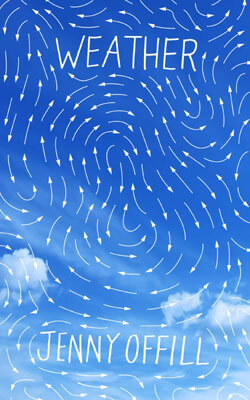Although I read Offill’s novel “Dept. of Speculation” over five years ago during one joyously long reading session on a plane, it stands out in my mind as so stylistically unique with a voice that seamlessly blends humour with poignant critiques on love and modern life. Her new novel “Weather” uses a similar style of narrative while engaging more overtly with current politics and social anxiety. Rather than a linear story we’re presented with clipped sections of text surrounding the life of Lizzie Benson, a librarian and mother living on the east coast of America. Brief scenes from her life are interspersed with paragraphs from journals or jokes. Together these form an impression (rather than a complete portrait) of her life and a sense of being in the time proceeding and immediately after Trump’s election. Hanging over the book is its characters’ impending sense of doom and a need to develop survival strategies for what they assume to be an inevitable disaster.
I love how close I came to feel with Lizzie even though the author consciously leaves out so many specifics and details about her life. It’s not exactly like stream of consciousness writing, but more like snapshots of experience that build to a wider worldview. She wryly notes encounters with some patrons at the library with their oddball questions or requests – this felt very true to life especially after reading about the kinds of encounters librarians must endure on a daily basis in Susan Orlean’s “The Library Book”. Throughout the book Lizzie will often recount facts or explain the background behind certain things. When she's asked at one point “How do you know all this?” she responds “I’m a fucking librarian.”
She also describes moments with her family from tender encounters to points of conflict. Her son might casually make a dismissive, insulting remark about her or there might be a description of her recovering drug addict brother Henry’s alarming erratic behaviour. Other times she'll reflect on the puzzling nature of relationships: “Funny how when you’re married all you want is to be anonymous to each other again, but when you’re anonymous all you want is to be married and reading together in bed.” Just a small snippet of dialogue or brief detail in this novel can unfold in a way that left me feeling I’d read a much longer and more fleshed out scene. It’s an impressive technique that compresses experience down to what’s most essential and impactful.
It's interesting to compare this novel to “Ducks, Newburyport”, one of my favourite books from last year. They both capture something essential about our modern day experience: how opinions are filtered through the media to form a consensus without proper debate or facts and how a profusion of news about global issues leads to deep-felt private anxiety. Lizzie has internalized this so much she often compares reality to the structure of a disaster movie and wryly notes how everyone assumes our planet must be soon abandoned: “Today NASA found seven new Earth-size planets. So there’s that.” But where Ellmann's novel brilliantly embraces the endless barrage of her protagonist's thoughts and the hilarious peculiarities of her internal logic, Offill presents a skilfully abbreviated view of one woman's reality as she navigates an increasingly absurd world. “Weather” is such a brilliant and accomplished novel.










